If You Only Have Time For One Video, Make It This One
if you only have time for one video, make it this one
More Posts from Inter-stellxr-blog and Others

reblog if you want anons but in reality no one is going to send you anything and will just reblog this

15 Years of Station Told in 15 Gifs
1. International Space Station Assembly Animation

From 1998 to 2011, five different space agencies representing 15 countries assembled the International Space Station, the largest structure ever built in space. Today humans are still living and work in the orbital laboratory. November 2, 2015 marks the 15th anniversary of continuous human presence onboard.
2. Entry of Expedition 1

Expedition 1 crew members including, Commander William Shepherd and Cosmonauts Sergei Krikalev and Yuri Gidzenko arrive to the International Space Station for the first time on November 2, 2000.
3. September 11, 2001

Expedition 3 Commander Frank Culbertson was the only American living off the planet on September 11, 2001. He captured his view of the fateful day from the space station.
4. Kibo

The Japanese Experiment Module, or Kibo, is installed to the space station on June 3, 2008. Kibo means “hope” in Japanese, and it is the largest single space station module.
5. First 6-person Crew

The first 6 person crew on the space station gathers for a press conference in May 29, 2009. Because it was comprised of astronauts from NASA, CSA, ESA, JAXA, and Russia, this was the first and only time all international partners were represented on the space station at the same time.
6. SpaceX Dragon

The space station’s robotic arm captures the SpaceX Dragon during its demonstration flight on May 25, 2012, making it the first commercial vehicle ever to dock with the space station.
7. Olympic Torch

Russian Cosmonauts Sergey Ryanzanskiy and Oleg Kotov bring the Olympic torch outside the space station during a spacewalk on November 9, 2013. The torch traveled to the station as part of the Olympic torch relay ahead of the 2014 Winter Olympics in Sochi, Russia.
8. Testing Fire in Space

Astronaut Reid Weisman captured a floating sphere of fire observed during the Flex-2 experiment on space station on July 18, 2014. The findings may lead to better engines here on Earth.
9. Aurora

Astronaut Reid Weisman’s timelapse of a flickering aurora seen from space station on August 28, 2014.
10. Sunrise

Astronaut Reid Weisman’s timelapse of what a sunrise looks like from the space station on September 23, 2014.
11. Water Bubbles

Astronaut Reid Weisman experiments with water bubbles in space on November 8, 2014.
12. GoPro

Astronauts Terry Virts and Barry “Butch” Wilmore capture the first GoPro footage of a spacewalk on February 25, 2015.
13. Lightning

Astronaut Terry Virts filmed a massive lightning storm over India from the space station on May 9, 2015.
14. Milky Way

Astronaut Terry Virts captured a stunning view of the Milky Way from space station on May 15, 2015.
15. Veggie

Astronauts Scott Kelly, Kjell Lindgren, and Kimiya Yui taste lettuce that had been grown and harvested in space for the very first time on August 10, 2015.
Make sure to follow us on Tumblr for your regular dose of space:http://nasa.tumblr.com
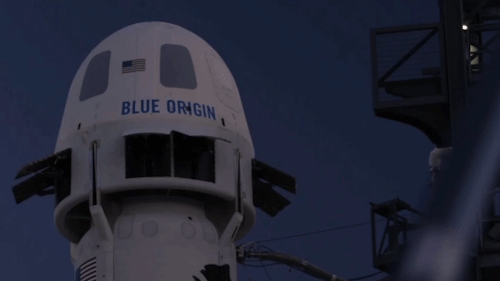
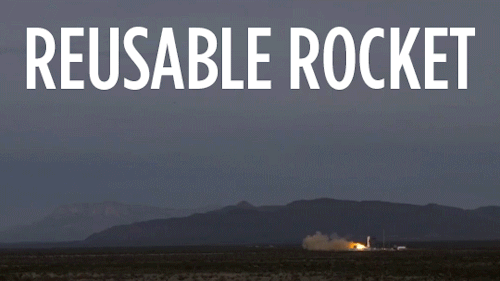

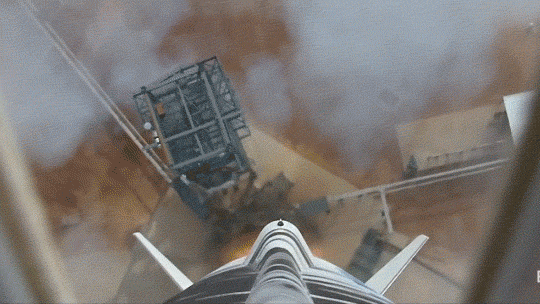
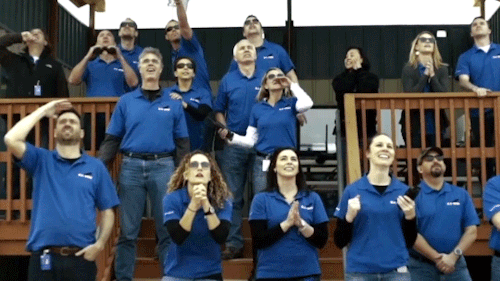
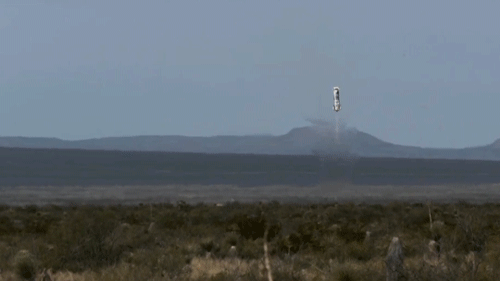
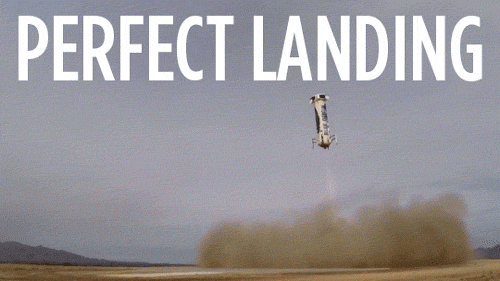
Via his very first tweet, Jeff Bezos announced that his spaceflight company has accomplished a historic first. It sent a rocket to the edge of space and then landed that rocket’s main fuselage gently on dry land.
Most things humans have sent into space are pushed up there by a disposable rocket. Once the rockets do their job, they fall back to earth, usually worse for wear. They have to be rebuilt each time (though sometimes their parts can be reused). That’s an expensive process, especially if you are a private company hoping to bring tourists to space. Virgin Atlantic, Elon Musk’s company SpaceX and Bezos’ Blue Origin all want to do just that.
And now Blue Origin has paved the way, landing its rocket on its second attempt (the propulsion module was destroyed when they first tried). Here’s the video in full:
Elon Musk responded to the news on Twitter. He pointed out that it requires much greater speed to actually reach orbit than it does to reach the edge of space. (Phil Plait has some good analysis of the exchange over on his Bad Astronomy blog.)
Still, it’s a pretty amazing accomplishment.








launched eighteen years ago, the cassini orbiter is set to crash in to saturn next september, ending its mission to collect data, including these true colour images, on saturn and it’s moons and rings. saturn’s main rings, composed mostly of ice, are thought to have formed only a few hundred million years ago, long after the planet, and the solar system itself, were birthed some four and half billion years ago.
though a hundred and seventy million miles in diameter, the main rings are only half a mile thick, with the brighter bands showing areas of greater density, and the darker, less dense areas swept relatively clear by the gravity of saturns’ moons - clear enough, anyways, for the cassini orbiter to pass through one of the gaps basically unscathed.
there is no consensus on how the rings were created, but a medium sized moon, either shattered by a meteor or pulled apart by the planet’s gravity, would account for the entire mass of the rings. there is, however, more of a consensus that in about fifty million years, saturn’s gravity will have pulled in the rings and swallowed them up. (but at least mars should have a ring by then.)
saturn has over forty moons, including one found within a ring gap. these photos show the distant rhea and titan - the latter of which is larger than mercury and has its own atmosphere and hydrocarbon lake - and the inner most mimas and enceladus - the latter being notable for its encompassing liquid ocean of water and geothermal activity.

Cygnus entering the atmosphere, photographed by Alexander Gerst on the ISS.






Check out these 10 cool facts about Venus here: http://astronomyisawesome.com/solar-systems/cool-facts-about-venus/

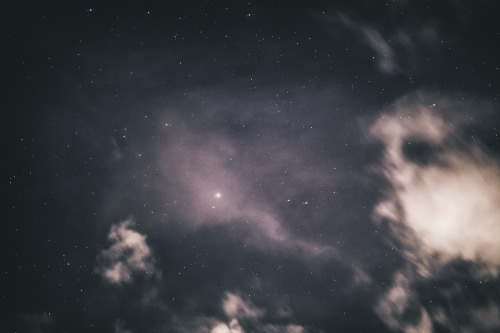
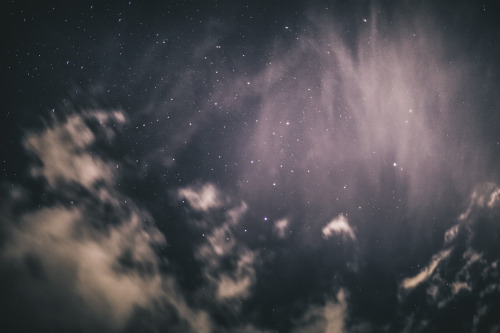
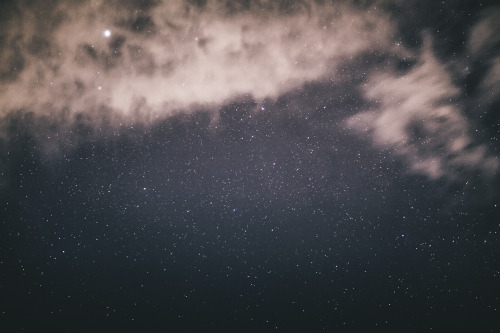
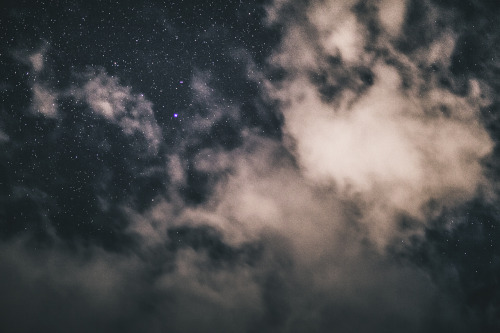

In June 2013, a group of friends encased a GoPro in a 3D-printed body, attached it to a weather balloon, and launched it. The weather balloon burst and the camera came careening back down to Earth, just as planned – only the crew never found it.
Two years later, a woman hiking in the desert found a camera in the rubble and brought it to the AT&T store where she worked. The owner of the SIM card was identified and the camera was returned to its original owners. Technology is pretty damn cool.
This breathtaking shot of the Grand Canyon from the stratosphere was taken from their footage.
Source
-RLO

We are not allowed to collect water from Mars. The Outer Space Treaty of 1967 forbids every nation in the world from sending humans or robots near celestial water sources for fear of contaminating them with life from Earth. Source
-
 masterwayne51 liked this · 1 week ago
masterwayne51 liked this · 1 week ago -
 headab0vethewavez reblogged this · 1 week ago
headab0vethewavez reblogged this · 1 week ago -
 darthschabba reblogged this · 2 weeks ago
darthschabba reblogged this · 2 weeks ago -
 fa-i-ze reblogged this · 2 weeks ago
fa-i-ze reblogged this · 2 weeks ago -
 thatsoutheastasian reblogged this · 1 month ago
thatsoutheastasian reblogged this · 1 month ago -
 darkocarina reblogged this · 1 month ago
darkocarina reblogged this · 1 month ago -
 amitybrightlights liked this · 1 month ago
amitybrightlights liked this · 1 month ago -
 phail reblogged this · 2 months ago
phail reblogged this · 2 months ago -
 artemis-grey reblogged this · 2 months ago
artemis-grey reblogged this · 2 months ago -
 artemis-grey liked this · 2 months ago
artemis-grey liked this · 2 months ago -
 koneko-nana reblogged this · 2 months ago
koneko-nana reblogged this · 2 months ago -
 poetic-veins liked this · 2 months ago
poetic-veins liked this · 2 months ago -
 myturtlegotjacked liked this · 2 months ago
myturtlegotjacked liked this · 2 months ago -
 regalvoid reblogged this · 2 months ago
regalvoid reblogged this · 2 months ago -
 fablescotch liked this · 2 months ago
fablescotch liked this · 2 months ago -
 fandomkeysmash reblogged this · 2 months ago
fandomkeysmash reblogged this · 2 months ago -
 amalgm-thing liked this · 3 months ago
amalgm-thing liked this · 3 months ago -
 tarawriter liked this · 3 months ago
tarawriter liked this · 3 months ago -
 silentiumdelirium reblogged this · 3 months ago
silentiumdelirium reblogged this · 3 months ago -
 toothlessthecatnoir liked this · 3 months ago
toothlessthecatnoir liked this · 3 months ago -
 thepiratemermaid reblogged this · 3 months ago
thepiratemermaid reblogged this · 3 months ago -
 kajepan liked this · 3 months ago
kajepan liked this · 3 months ago -
 intergalactictrickster reblogged this · 3 months ago
intergalactictrickster reblogged this · 3 months ago -
 importantpiratesgetscaredofme reblogged this · 3 months ago
importantpiratesgetscaredofme reblogged this · 3 months ago -
 importantpiratesgetscaredofme liked this · 3 months ago
importantpiratesgetscaredofme liked this · 3 months ago -
 acerola-tree reblogged this · 3 months ago
acerola-tree reblogged this · 3 months ago -
 acerola-tree liked this · 3 months ago
acerola-tree liked this · 3 months ago -
 thepiratemermaid reblogged this · 3 months ago
thepiratemermaid reblogged this · 3 months ago -
 thegodfrog reblogged this · 3 months ago
thegodfrog reblogged this · 3 months ago -
 thegodfrog liked this · 3 months ago
thegodfrog liked this · 3 months ago -
 standard-human reblogged this · 3 months ago
standard-human reblogged this · 3 months ago -
 standard-human liked this · 3 months ago
standard-human liked this · 3 months ago -
 bedbug522 reblogged this · 3 months ago
bedbug522 reblogged this · 3 months ago -
 bedbug522 liked this · 3 months ago
bedbug522 liked this · 3 months ago -
 fluffygiraffe liked this · 3 months ago
fluffygiraffe liked this · 3 months ago -
 literallyjustsomething reblogged this · 3 months ago
literallyjustsomething reblogged this · 3 months ago -
 literallyjustsomething liked this · 3 months ago
literallyjustsomething liked this · 3 months ago -
 racingdino liked this · 3 months ago
racingdino liked this · 3 months ago -
 sasukebutmorebratty reblogged this · 3 months ago
sasukebutmorebratty reblogged this · 3 months ago -
 sasukebutmorebratty liked this · 3 months ago
sasukebutmorebratty liked this · 3 months ago -
 strawb3rrysugar liked this · 3 months ago
strawb3rrysugar liked this · 3 months ago -
 antlerkitty liked this · 3 months ago
antlerkitty liked this · 3 months ago -
 alexthequeerqueer liked this · 3 months ago
alexthequeerqueer liked this · 3 months ago -
 octobercowboy liked this · 3 months ago
octobercowboy liked this · 3 months ago -
 listerthedrummer reblogged this · 3 months ago
listerthedrummer reblogged this · 3 months ago -
 turtl3sk3tch3s liked this · 3 months ago
turtl3sk3tch3s liked this · 3 months ago -
 pokeleyn liked this · 3 months ago
pokeleyn liked this · 3 months ago -
 turtley-ausome reblogged this · 3 months ago
turtley-ausome reblogged this · 3 months ago -
 turtley-ausome liked this · 3 months ago
turtley-ausome liked this · 3 months ago
"I don't know who will read this. I guess someone will find it eventually. Maybe in a hundred years or so." -Mark Watney
174 posts